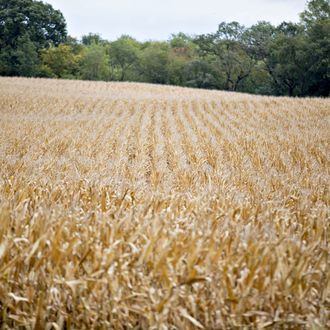
Get into a debate over GMOs, and any proponent will eventually contend that the re-engineered Über-crops are more robust, higher yielding, and less vulnerable to pests. But an “extensive” report by the New York Times this weekend throws a massive wrench in that argument — GM crops, the data suggest, are actually kind of pointless:
The controversy over genetically modified crops has long focused on largely unsubstantiated fears that they are unsafe to eat.
But an extensive examination by The New York Times indicates that the debate has missed a more basic problem — genetic modification in the United States and Canada has not accelerated increases in crop yields or led to an overall reduction in the use of chemical pesticides.
The Times arrived at its findings by comparing crops in Europe, where GMOs are largely banned, to crops in North America, where they aren’t. If GMOs are good because they’re less vulnerable to certain types of pests, then a reduction in pesticide use would naturally be expected to follow. The report says that’s not happened: While America’s insecticide use has fallen by a third since GM crops were introduced, the use of herbicides — to kill the weeds that pop up in much greater quantities — has gone up by 21 percent. (In France, by contrast, the use of insecticides has dropped 65 percent, and herbicide usage is down 36 percent.)
But anyone who’s fine with the pesticides might imagine these biotech crops are at least really crankin’ out the grains and produce, yet data don’t show that to be the case, either: Per U.N. figures, both America and Canada “have gained no discernible advantage in yields — food per acre — when measured against Western Europe.” This mirrors a finding by the top U.S. science panel earlier this year that said “there was little evidence” GMOs had improved crop yields whatsoever.
Monsanto’s reply to the Times is that the paper “cherry-picked its data to reflect poorly on the industry.” According to chief technology officer Robert Fraley, “Every farmer is a smart businessperson, and a farmer is not going to pay for a technology if they don’t think it provides a major benefit.” There’s just no way Monsanto could ever convince farmers to buy something that didn’t live up to its advertising.




